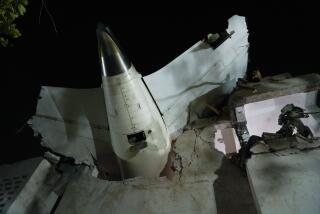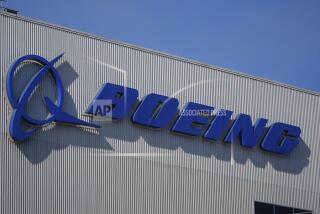Boeing Says It Will Keep Making 717s
- Share via
Boeing Co. said Thursday that it has decided against shutting down its 717 jetliner program, although an expected cut in the production rate could mean additional layoffs at Southern California’s last remaining commercial aircraft manufacturing facility.
The decision grants another reprieve to the Long Beach plant, which has lurched from one crisis to another over the last 20 years amid repeated efforts to squeeze profits from dwindling sales.
The announcement prompted mixed reaction from the 2,300 employees who work on the 717 line, which is in the midst of a major layoff that the company started this year.
As Boeing continues to cut thousands of jobs across the country, it is triggering growing anxiety among workers and politicians. Indeed, members of Congress from Eastern states lashed out at Boeing on Thursday over layoffs at a helicopter plant in Pennsylvania.
Boeing also said it will take a one-time, after-tax charge of $700 million against earnings in the current quarter, reflecting a dramatic downturn in orders for its entire line of commercial jetliners since the Sept. 11 terrorist attacks.
The charge, equal to 86 cents a share, was in line with what analysts expected, but it could wipe out fourth-quarter income for the aerospace firm and could even lead to a loss.
Still, anxious investors were relieved that the company did not lower forecasts for already reduced production rates and revenue, sparking a small jump in Boeing shares. Although shares of most aerospace companies declined Thursday, Boeing stock rose 20 cents to $37 in trading on the New York Stock Exchange.
Sales of commercial jets were slowing even before Sept. 11, but the attacks pushed the airline industry into a precipitous decline as skittish travelers avoided air travel and the demand for aircraft declined further. The 717 program was hit particularly hard, and in October Boeing said it was considering phasing out the line.
But pressure from existing and potential customers apparently persuaded Boeing to keep the program alive. Moreover, canceling the 717 would have been costly because of contractual obligations Boeing has with suppliers. Also, the company did not relish the prospects of ceding the small jetliner business to archrival Airbus, which makes the 100-passenger 318.
“Right now, it’s best for us to continue making this airplane,” said Michael Sears, Boeing’s chief financial officer.
The reaction was tempered among workers in Long Beach, where the 106-passenger jet is assembled. They were relieved that the business was not shuttered, but worry about another round of job cuts. The company was already in the middle of slashing 1,200 jobs in Long Beach when Boeing announced in October that it was considering stopping production. About 2,300 employees currently work on the 717, according to union officials.
“It’s not something where you can sit back and put your legs up,” said Edgar “Tom” Suter, a 35-year veteran who works in product support. “But it’s a lot better than the alternative where they said they were going to pull the plug.”
Boeing executives declined to say by how much the production rate would be decreased, although analysts said it may drop as low as one airplane a month, down from the current rate of 21/2. Before the slowdown, the sprawling Long Beach facility was producing five airplanes a month.
“Our market has been really slow to develop and people were concerned, but the company said they were committed to the airplane and that’s what we wanted to hear,” said John Thom, a spokesman for Boeing’s commercial aircraft unit in Long Beach.
The company was scheduled to deliver its 90th 717 today, leaving a backlog of 47. If Boeing were to reduce the production rate to one a month, the Long Beach plant could remain open for four years.
Boeing has not garnered a firm order since last year, although it did sign a memorandum of understanding with Midwest Express in April for 20 planes, with an option to purchase 30 more.
Boeing executives said talks are ongoing with Midwest to finalize the deal.
Midwest, a regional carrier, wants to replace its aging fleet of DC-9s and MD-80s with the 717, which is derived from the DC-9.
In earlier filings with the Securities and Exchange Commission, Boeing said it would need to sell 200 717s to break even.
Meanwhile, another decision by Boeing to keep its Ridley Township, Pa.-based helicopter unit operating has prompted an unusually harsh rebuke from members of Congress. In announcing the decision, Boeing said it will have to cut 1,000 to 1,500 jobs at the plant, which makes the Army’s CH-47 Chinook and RAH-66 Comanche helicopters as well as the Marine Corps’ V-22 Osprey tilt-rotor aircraft.
Twenty-nine House members and two senators from four states in the Northeast--Pennsylvania, New Jersey, Maryland and Delaware--signed a statement demanding a meeting with Boeing executives.
Rep. Curt Weldon, a Pennsylvania Republican and chairman of the House military procurement subcommittee, threatened to bar Boeing lobbyists from congressional offices if the company fails to provide a good explanation for cutting the work force.
More to Read
Inside the business of entertainment
The Wide Shot brings you news, analysis and insights on everything from streaming wars to production — and what it all means for the future.
You may occasionally receive promotional content from the Los Angeles Times.










